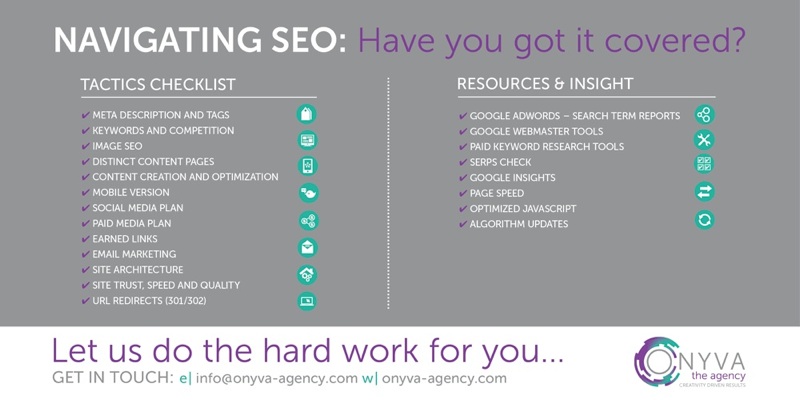SEO is an iterative process. As such, you need to keep abreast of multiple ranking factors, and their potential weighting in proprietary search engine algorithm updates to make changes that matter. Our infographic provides a straight-forward SEO checklist into tactics and resources, to ensure you’ve got the key things covered.
SEO in the B2B scientific sector
Navigating SEO in a B2B setting for product marketing in the life sciences, biotech, medical or tech fields is business critical. Although, it comes with it’s own unique challenges, versus B2C or retail sectors. You’ll likely be including very similar technical terminology to your competitors, therefore, will need to experiment and use innovative ways to ensure you rank ahead.Key steps in your SEO plan
If you are at the early stages of formulating an SEO plan, here are some key questions to ask:-
- What are your goals for SEO, and how much budget do you have to assign to it?
- What are customers searching for, to find your product or services?
If the answer here is “we are not sure,” or “we are subjectively guessing what it is,”, you will need to dedicate time for search term and keyword research. When you’re marketing B2B, as a life sciences, biotechnology, medical or tech company, you’ll undoubtedly have considerable in-house expertise. As a result, it can be tempting to second guess and assume you know how a customer will behave.Whilst your specialist knowledge can serve you well, we’ve encountered many instances where clients have been surprised to learn how their users are finding their products. Remember, subtle differences and variations in keywords can have a profound impact on SEO. Furthermore, keyword research tools (e.g Google Keyword Planner , Moz’s Keyword explorer and SEM Rush, to name a few, can be a huge help. Tie these in with information from search term reports from PPC, Google Trends , or other similar tools and you have a great start.
One issue you may face in a B2B environment with specialised products, is a lack of search volume for definitive data. One approach here would be to supplement data with direct user interactions from surveys.
Some key questions and points to consider when optimising your SEO strategy and content:
- Based on your research what keywords do you want to rank highly for?
- What are competitors ranking highly for?
- Are you ensuring you use your SEO research to drive your online content marketing and distribution plan? (NB: it should be this way around).
- Will your content help you earn inbound links? Take a look at whose linking to your competitors – would they link to your content as well?
- Do you have a social media plan to share content, and drive users back to your site?
- How are you going to measure success? What metrics are key?
- Have you ensured you’re using Google Analytics to track traffic and sources? Here’s a useful guide for 2020 interface set up from Website Planet.
- Have you got your on-page SEO optimised? Meta-descriptions are critical as Google matches searches based on this content and displays them in SERPS. Also consider, the slug, keyword density, and readability factors (sub-heading distribution, paragraph structure, use of active voice and transition words etc.,)
- Are you just launching your new site? Have you got the site technical basics covered to ensure search engines trust your site? (SSL certificate, HTTPS, optimised speed of page delivery, mobile-version, privacy policy, cookie opt-in, Robots.txt, Search engine SiteMap.XML, verified postal address and a custom 404 page etc.,).
Still need more help with implementing website SEO? We offer a comprehensive service to help improve search rankings,combined with technical content production. Get in touch with our team now.


